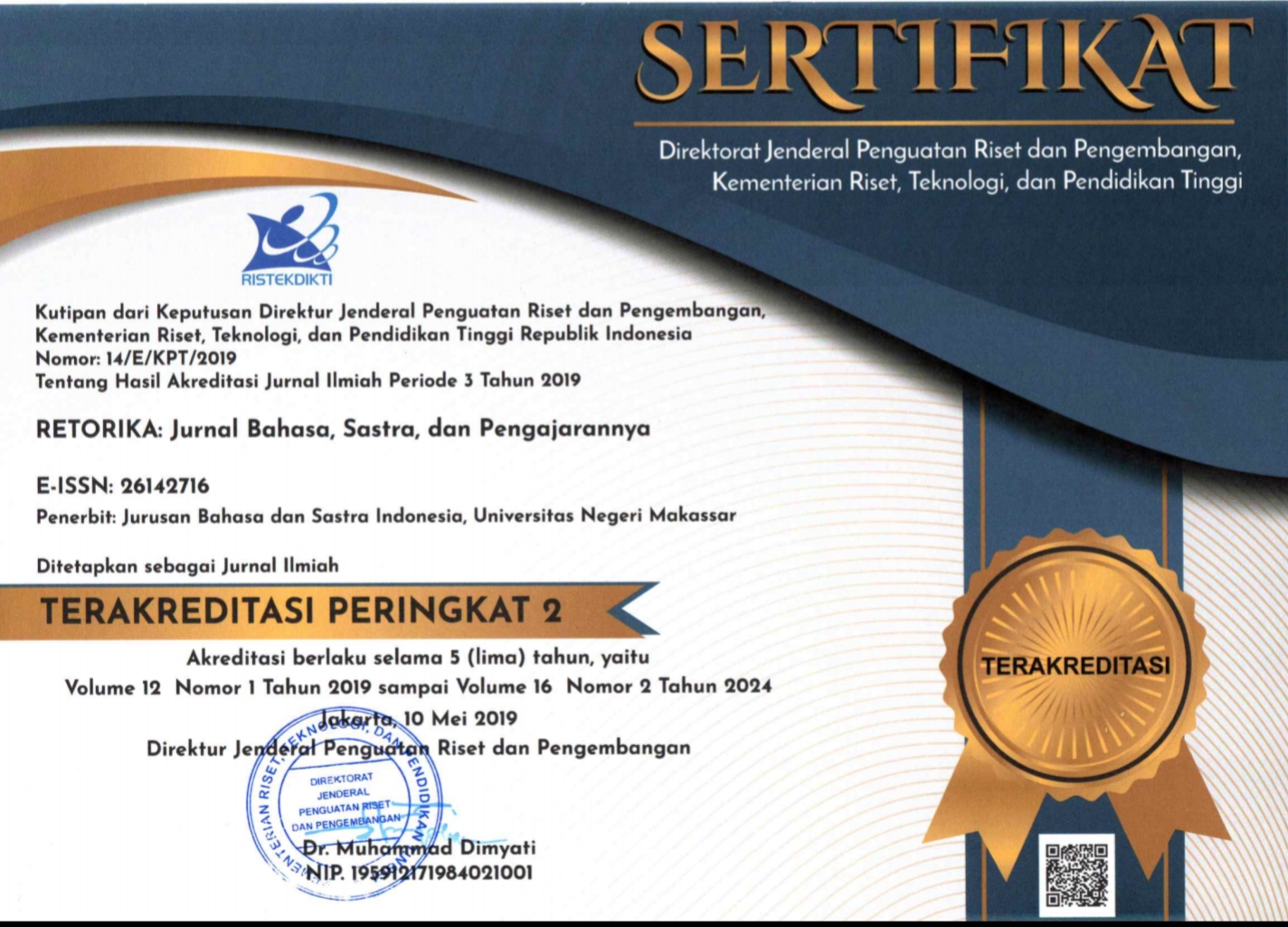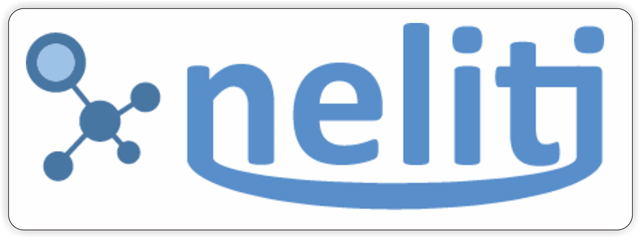IDEOLOGI SEKULARISME DALAM KOMENTAR MASYARAKAT TENTANG WACANA PILKADA DKI JAKARTA DI MEDIA SOSIAL
(1) Universitas Negeri Padang
(2) Universitas Negeri Padang
(3) Universitas Negeri Padang
(*) Corresponding Author
DOI: https://doi.org/10.26858/retorika.v12i2.8627
Abstract
Abstract: The Ideology of Secularism in the Public Comment on the Discourse of DKI Jakarta Pilkada on Social Media. This study aims to determine the realization of secularism in the public comment text on the DKI Jakarta Pilkada news discourse on social media in terms of vocabulary and sentence structure. This study uses a qualitative-descriptive approach and content analysis method based on Norman Fairclough's theory of critical discourse. The results of the study show that the ideology of secularism is realized: (1) using words that are not related to religion such as the words smart, objective, rational, not, real work etc. which is associated with context; (2) active sentences, with the aim of further highlighting the actors and objects of events; and (3) passive sentences, with the aim of further highlighting the target and hiding the perpetrator. Ideology in discourse can be expressed through vocabulary choices and sentence structure in text through critical discourse analysis, both in mass media texts, and in individual texts (comments) on social media.
Keywords
Full Text:
PDFReferences
Ahmadi, H. dan Asl, E. S. 2013. Editorials and Ideologies. International Journal of Culture Sains dan Olahraga, 1 (4): 11–21.
Ahmed, S. 2014. Critical discourse analysis of primer minister’s speeches on harmful aerial vehicles (drones). International Journal of Language and Linguistics, 1 (2): 37–44.
Alami, A. N. 2013. Menakar Kekuatan Media Sosial Menjelang Pemilu 2014. Jurnal Penelitian Politik, 10 (1): 85–99.
Ali, M. K. & Nordin, M. Z. F. 2016. Linguistic Legitimation of Political Events in Newspaper Discourse Advances in Language and Literary Studies, 7 (4): 76–83.
Altwajri, A.O. 1997. Islam, Barat, dan Kebebsan Akademis. Yogyakarta: Titian Ilahi Press.
Asghar, J. (2014). Language Power and Ideology in Commercial Discourse: A Prologue to Critical Dicourse Analysis for Neophyte Analysts. Academic Journal of Interdisciplinary Studies, 3 (4): 252–262.
Asghar, J. 2014. Words Speak Louder than Actions: A Critical Analysis of Ideological Perspectives in Media Discourse. International Journal of Humanities and Social Science, 4 (5): 169–181.
Budiyono. 2016. Media Sosial dan Komunikasi Politik: Media Sosial sebagai Komunikasi Politik Menjelang Pilkada DKI Jakarta 2017. Jurnal Komunikasi. 11 (1): 47–62.
Bukhari, N. H. S. dan Xiaoyang, W. 2013. Critical Discourse Analysis and Educational Research. Journal of Research & Method in Education (IOSR-JRME), 3 (1): 9–17.
Eriyanto. 2009. Analisis wacana pengantar analisis teks media. Yogyakarta: LkiS.
Faghih, E. & Moghiti, R. 2017. Persian Renderings of English Conceptual Discourse Patterns: A Case Study of Animal Farm. International Journal of Comparative Literature & Translation. Volume 5 (3): 55–66.
Fairclough, N. 2003. Language and Power: Relasi Bahasa, Kekuasaan, dan Ideologi. Malang: Boyan Publishing.
Faris, A. A. dan Paramasivam, S. 2016. Ideologies in Mandela’s No Easy Walk to Freedom. International Journal of Applied Linguistics & English Literature, 5 (5): 49–61.
Hurd, E. S. 2004. The Political Authority of Secularism in International Relations. European Journal of International Relation, 10 (2): 235–262.
Miles, M.B. dan Huberman, A.M. 1992. Analisis data kualitatif. Terj. Tjetjep Rohendi Rohidi. Jakarta: University Indonesia Perss.
Mohammadi, M. & Javadi, J. 2017. A Critical Discourse Analysis of Donald Trump’s Language Usein US Presidential Campaign, 2016. International Journal of Applied Linguistics & English Literature, 6 (5): 1–10.
Rahimi, F. dan Riasati, M. J. 2011. Critical Discourse Analysis: Scrutinizing Ideologically-Driven Discourses. International Journal of Humanities and Social Science, 1 (16): 107–112.
Ramanathan, R. dan Hoon, T. B. 2016. Application of Critical Discourse Analysis in Media Discourse Studies. The Southeast Asian Journal of English Language Studies, 21 (2).
Sideeg, A. I. A. 2015. Traces of Ideology in Translating the Qurān into English: A Critical Discourse Analysis of Six Cases Across Twenty Versions. International Journal of Applied Linguistics & English Literature, 4 (5): 214–226.
Shahsavar, Z. & Naderi, M. S. H. 2015. Investigating the Influence of Ideology on Translation: A Critical Discourse Analysis of “ATale of Two Cities” and Its Persian Translations. International Journal of English Language Translation Studies. Published on: 07/03/2015.
Sobur, A. 2016. Analisis Teks Media: Suatu Pengantar untuk Analisis Wacana, Analisis Semiotik, dan Analisis Framing. Bandung: Remaja Rosdakarya.
Sugiyono. 2010. Metode Penelitian Pendidikan. Ban-dung: Alfabeta.
Susanto, A. 2013. Filsafat Ilmu: Suatu Kajian dalam Dimensi Ontologis, Epistimologis, dan Aksio-logis. Jakarta: Bumi Aksara.
Syam, F. 2010. Pemikiran Politik Barat: Sejarah, Filsafat, Ideologi, dan Pengaruhnya tehadap Dunia ke-3. Jakarta: PT Bumi Aksara.
Tiwary, P. 2017. The Ideology of Secularism in Indian Constitution. International Journal of Humanities and Social Science Research, 3 (2): 43–50.
Usfinit, Y., Suprojo, A., & Setyawan, D. 2014. Perspektif Partisipasi Politik Masyarakat pada Pemilihan Kepala Daerah (pilkada) Kota Malang. Jurnal Ilmu Sosial dan Ilmu Politik 3 (1): 38–45.
Vahid, H. 2012. The Power Behind Images: Advertisement Discourse in Focus. International Journal of Linguistics, 4 (4): 36–48.
Widyawari, C. P. G. dan Zulaeha, I. 2016. Representasi Ideologi dalam Tuturan Santun para Pejabat Negara pada Talk Show Mata Najwa. Jurnal Pendidikan Bahasa dan Sastra Indonesia Seloka 5 (1): 1–11.
Article Metrics
Abstract view : 790 times | PDF view : 119 timesRefbacks
- There are currently no refbacks.
Copyright (c) 2019 Liza Halimatul Humairah, Agustina Agustina, Ngusman Abdul Manaf

This work is licensed under a Creative Commons Attribution-NonCommercial 4.0 International License.
Published by:
Department of Indonesian Language, Faculty of Languages and Literature, Universitas Negeri Makassar in cooperate with Asosiasi Dosen Bahasa dan Sastra Indonesia (ADOBSI) and Ikatan Program Studi Pendidikan Bahasa dan Sastra Indonesia (IKAPROBSI).
Address: Department of Indonesian Language Office, DG Building Second Floor, UNM Parangtambung, Daeng Tata Raya Street, Makassar, South Sulawesi, Indonesia
 Email: retorika@unm.ac.id
Email: retorika@unm.ac.id

RETORIKA: Jurnal Bahasa, Sastra,dan Pengajarannya is licensed under a Creative Commons Attribution-NonCommercial 4.0 International License.
















